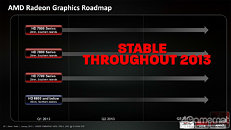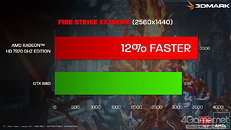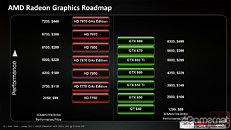Sunday, February 10th 2013

No New GPUs from AMD for the Bulk of 2013
AMD's product manager for desktop graphics products Devon Nekechuk, in an interview with Japanese publication 4Gamer.net, revealed that his firm won't be launching any new Radeon GPUs in 2013, and that the company would instead play out the year on its current Radeon HD 7000 series' performance, with price adjustments and possible performance increments through driver updates. In a slide released to 4Gamers.net, AMD pointed that its Radeon HD 7900 series (high-end), HD 7800 series (performance), and HD 7700 series (mainstream), will carry on the company's mantle "throughout 2013."
This announcement is indication that GPU makers have decided to slow things down from the streak of rapid new GPU launches that lasted from some time around 2007, running up to 2012, which can be heavily taxing in terms of R&D costs for either companies. We know for sure that NVIDIA is clearing its backlog of consumer GPU development by releasing the GeForce GTX "Titan" graphics card in a couple of weeks' time, and we know from older reports that NVIDIA could launch a "refreshed" GeForce Kepler lineup, that largely retains the GeForce Kepler silicon while topping up with subtle changes (clock speeds, software features that don't involve redesigning the silicon, etc.,) but AMD coming out in the open with this announcement could change everything. NVIDIA has the opportunity to save a few coins by sticking to its current lineup (plus the upcoming GTX "Titan,") and responding to competition from AMD by price-adjustments and timely driver optimizations of its own.
Source:
4Gamer.net
This announcement is indication that GPU makers have decided to slow things down from the streak of rapid new GPU launches that lasted from some time around 2007, running up to 2012, which can be heavily taxing in terms of R&D costs for either companies. We know for sure that NVIDIA is clearing its backlog of consumer GPU development by releasing the GeForce GTX "Titan" graphics card in a couple of weeks' time, and we know from older reports that NVIDIA could launch a "refreshed" GeForce Kepler lineup, that largely retains the GeForce Kepler silicon while topping up with subtle changes (clock speeds, software features that don't involve redesigning the silicon, etc.,) but AMD coming out in the open with this announcement could change everything. NVIDIA has the opportunity to save a few coins by sticking to its current lineup (plus the upcoming GTX "Titan,") and responding to competition from AMD by price-adjustments and timely driver optimizations of its own.



233 Comments on No New GPUs from AMD for the Bulk of 2013
Anyway, can't AMD do 192/320bit buses? I know nVidia can...
But either way, all in all a 2-year schedule with a bigger performance boost from generation to generation seems way more rational/market-friendly and even more profitable (if done right).
If AMD can ever fix the latency/stutter issues on 7970 CF, I won't be upgrading for a long time. If they can't do that, I'll be heading for GTX 780 SLI or whatever the next high end thing is from Nvidia.
I haven't experienced any significant graphics problems since going over to nvidia in 2009 and I'm now on my third graphics card with them (GTX 285, GTX 580, GTX 590).
However, I also see many people with AMD cards which work just fine and in CF too, to be fair.
You're dead wrong there howver. I have a 120Hz monitor and gaming at a solid 120fps makes for a massive improvement, easily visible without even trying to look for it. It's even noticeable just moving the mouse and windows around the desktop.
And finally, my monitor can handle 144Hz and yes, you can see the difference when compared to 120Hz, although it's more subtle.
AMD has stuttering issues with crossfire, and I have zero ideas why they can't improve it. When I (and many others) can vastly improve the experience by just using a framerate limiter, why the heck can't AMD figure out what the problem is and fix it? Makes no sense to me at all...
I've more or less alternated between AMD and Nvidia over my 15 years of building PCs but if Nvidia can release something that doesn't suck to me, my 7970 experiment may be a short lived one.
There was a review on another site the showed jitter and that running 3 cards in crossfire had less jitter than 2 and I would hypothesize that it happens because two of the three cards has the latency introduced because of the crossfire bridge and one gpu being master. So what happens is two out of 3 frames render in about the same amount of time with 1 frame getting rendered slightly faster. So the frame rate jitters less often than with two cards.
So since you have a frame rendering where you do not know how long it will take to render, then the next frame that might render more quickly or slowly than the last frame depending on what has changed on top of the added latency of the crossfire link and the master handling the frame buffer. So you tell me, how do you make that jitter less? I suspect both AMD and nVidia have programmers and engineers thinking about it but it's a tough problem, so don't go blaming either company for their multi-gpu short-comings because it's not an easy problem to solve at all.
That's what makes no sense to me. I'm not claiming to be a tech guru about this, but it isn't obvious at all to me why that would be so difficult to do.